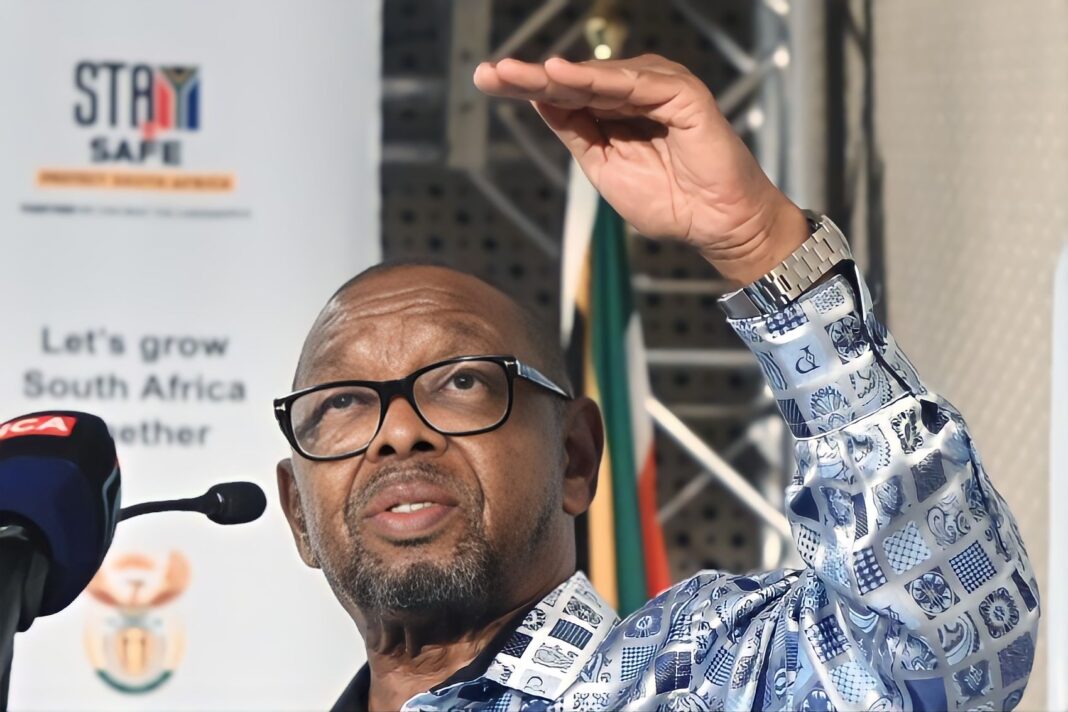Johnathan Paoli
Higher Education Minister Blade Nzimande has praised the provision of government funding to the education sector “as above global standards” and said despite challenges, namely late applications and outstanding Nsfas disbursement, the country’s tertiary education institutions were ready for the 2024 academic year.
Minister Nzimande gave an update on Tuesday afternoon at the Ronnie Mamoepa Media Centre in Hatfield, Pretoria on the state of readiness for institutions of higher learning following the release of matric results, and said that the country was currently spending at least 7% of the country’s GDP on education, which is a percentage higher than what was recommended.
The minister said this was evidence of the government’s commitment to equal access to education for all South Africans.
“We are above international norms on expenditure and percentage-wise, even exceed or proportionately, the expenditure of BRICS countries as well as the average for the Organization for Economic Co-operation and Development (OECD) countries,” Nzimande said.
The minister said that since the advent of democracy the government has ensured substantial growth in terms of access, by systematically transforming the nature, size and shape of the Post-School Education and Training (PSET) system to meet SA’s vital developmental goals.
Nzimande that SA universities were poised to meet the National Development Plan enrollment target of 1.62 million by 2030 and that a decision had been taken to further massify the TVET colleges system towards the goal of 2.5 million enrollment although this would require higher investment, infrastructure development and additional staff and educator resources.

The minister said that in order to ensure the success of PSET, the department of Higher Education vigorously promoted the attainment of higher levels of success and graduation rates of students as well as TVET college certification rates increased significantly.
“This is a clear success story of the 6th administration and a lasting legacy for future generations,” Nzimande said.
The department has increased the enrollment of women and men, with over 80% of total enrollment being Africans and the period of 2016-2023 saw an increase of disabled students to about 0.8%.
Last week, the class of 2023 made history by recording the highest pass rate percentage since the dawn of democracy.
The Minister said that the focus was on universities, as successful candidates were now transitioning to the higher education sector.
Several universities have cited, among other issues, that they have received applications that far exceed the number of spaces available to prospective students.
The minister repeated President Cyril Ramaphosa’s promises of the building of two new tertiary institutions, namely the University of Science and Innovation in Ekurhuleni and the University of Crime and Policing studies in Hammanskraal, and said detail plans were in place to enable the long term development of new academic institutions, which is expected to commence in 2024.
Nzimande said the department would continue to refine their programmes to be responsive to the needs of the market and would increase learning programmes required for occupations in high demand.
The minister confirmed that the department has facilitated a monitoring tool to assess registration, readiness for teaching and learning, student academic support, management and stakeholder relations, plans for funding new and returning students, and the status of institutional finances and challenges.
Nzimande said that TVET college classes had commenced on 15 January and that 482244 students were enrolled for 2024 in all programmes, with ministerially funded programme enrollment sitting at 407762, of which 166634 were new students.
However, the minister said that despite the TVET college budget being initially increased by 3-4%, due to increases in programme costs, and employee compensation which amounted to over 10%, the budget in real terms had decreased
As a result the ministerially funded programme would decrease by more than 15%, resulting in fewer students.
The minister praised last year’s achievements and confirmed that 19536 artisans were produced, and 45146 learnerships completed. 83578 learners completed skills programmes, and 99778 work based learning opportunities were facilitated.
In terms of matters related to NSFAS-funded students, many have lodged complaints of not receiving their funds while the clock ticks for registrations, and the minister called upon the funding scheme to speedily resolve the backlog.
Nzimande praised the scheme as unique and the only government agency in the world that provided a wrap-around and comprehensive funding mechanism to students.
The minister said that whatever challenges NSFAS might face, in terms of its funding it had increased from 21.4 million in 1991 to 48 billion in 2023.
“I welcome the intervention by the board of Nsfas to ensure that it develops mechanisms to deal with all the challenges in the scheme. I will continue to monitor the developments to ascertain whether the scheme is capable of delivering its mandate,” Nzimande said.
In terms of the outstanding disbursements, following on the announcement by the scheme on 18 January, Nzimande called upon the scheme to work together with the affected institutions in order to ensure that they speedily resolve all the outstanding cases and urged that in the meantime, aspirant students not be denied a place.
The minister noted with concern that the main reason for the outstanding payments was due to reconciliations that Nsfas had been engaged with these institutions predominantly because of registration data changes
“Nsfas needs to be more strict in 2024 on how it manages registration adjustment processes and institutions ought to submit their registration info timeously and accurately,” Nzimande said.
The minister confirmed that the scheme had received 1.5 million applications as of the 21st of this month and that Nsfas provisionally funded 657 703 applicants, the majority of whom are SASSA recipients.
Anticipates additional application
Nzimande said that in order to ensure a smooth beginning, Nsfas would process up to 4.2 billion upfront payment to all colleges and universities prior to finalisation of applications and the registration period.
In addition, the minister said that out of its financial reserve, Nsfas would pay 1 billion to TVET and 3.2 billion to universities for registration and initial payment.
Nzimande confirmed that the scheme funded over 70% of university students and over 90% of TVET college students.
The minister said that community colleges who opened on 18 January had approximately 75000 spaces available, and have invested in a new programme of Civic Education, in addition to skills programmes, occupation programmes, learnerships and non-formal programmes.
Nzimande said that over 270000 applications for scarce skills, with 67929 first time applications with 18541 new students in the field of engineering, 16415 students in the field of life and physical science, 614 applications to animals science, 206 in veterinary science, 9455 in human health and 22698 in teacher education.
Nzimande said that due to the delay in the matric result, several universities were unwilling to accept late applications but listed those still open to late applications, namely Cape Peninsula University of Technology, Durban University of Technology, Mangosuthu Buthelezi University of Technology, UCKAR, Tshwane University of Technology, University of Fort Hare, University of Zululand, Walter Sisulu University.
The minister concluded with an appeal to parents, guardians and aspirant students to remain wary and vigilant of the proliferation of unregistered colleges and other forms of criminal behaviour seeking to embezzle funds and defraud unsuspecting victims.
The minister’s briefing also comes on the back of recent allegations that he received kickbacks from NSFAS service providers in order to secure tenders, allegations that he has vehemently denied, saying they form part of a smear campaign against him.
Meanwhile the EFF has critically engaged the minister following a request by the party for accountability on issues pertaining to student funding and an appraisal on the readiness to reopen institutions, revealed insight into critical issues confronting the sector that require coherent institutional and systemic planning, to avoid the perennial protests that characterize the sector and result in the disadvantaging of thousands of poor and needy students.
“We as the EFF believe that the Department of Higher Education and NSFAS are not adequately prepared to receive thousands of students who are expected to commence the 2024 academic year in the next few weeks,” spokesperson Sinawo Thambo said.
The party said that a major concern to date, was a specific recommendation which had not been implemented, yet as things stand, the scheme did not have a CEO or a board Chairperson, due to the purported nefarious links these companies have with these respective individuals.
“There seems to be no concrete contingency plan as to how student allowance disbursements will be made to students for the 2024 academic year, as NSFAS, according to the Minister is not bound by the recommendations of the report, and has to go to court to terminate the contracts of the irregularly appointed service providers,” Thambo said.
The Red Berets said that it was committed to ensuring that corruption would be uprooted in the Higher Education sphere, and that all students would have access to education, and that no student would be denied access to tertiary education due to lack of affordability, or have their dignity denied due to a lack of accommodation.
INSIDE EDUCATION

